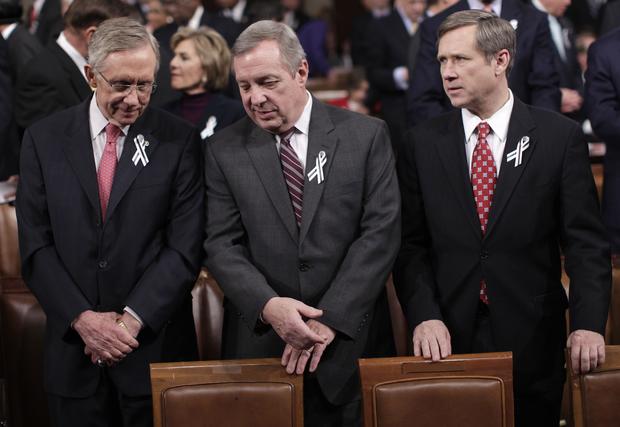60-Vote Threshold in Senate to Continue
Updated 6:36 p.m. Eastern Time
Despite the best efforts of a group of Democratic senators, the Senate filibuster rule is largely staying intact. Senators today decisively voted down their proposal to curtail the power of the the filibuster today amid concerns that doing so meant taking took too much power away from the minority.
Because of the filibuster, it takes 60 votes (and up to three days of precious Senate time) to pass nearly anything through the 100-member Senate, not just a simple majority. Had the filibuster rule not existed in the last Congress, health care reform legislation would have passed easily - and may have included the public option. The Wall Street reform bill would have been stronger. The DREAM Act providing a path to citizenship for upstanding young people brought to American illegally would now be law. And that's just for starters - the threat of the filibuster means that virtually every piece of legislation before the Senate needs 60 votes to become law.
Three Democratic senators - Tom Harkin, Jeff Merkley, and Tom Udall - have been pushing for the filibuster rule to be changed. One of their proposals would have gradually reduced the number of votes to break a filibuster - after a certain amount of time, for example, it would have only taken 55 votes to break one, and then, eventually, a simple majority.
After negotiating with colleagues, the three senators then put forth a relatively-modest proposal that would not eliminate the filibuster, but would mandate that it can't be used on procedural motions and require that senators actually remain on the floor to filibuster, "Mr. Smith Goes to Washington"-style.
But even that was too much change for senators. Instead, a deal was worked out that does include some minor changes to the system but leaves the filibuster rule largely in place.
Sen. Charles Schumer described part of the deal that has been worked out this way, according to his remarks as prepared for delivery: "The Leaders, as you heard earlier today, have agreed between themselves to minimize filibusters on motions to proceed, and to allow the introduction of more amendments - something which should make this Congress function much differently than the last one." (This is, it appears, a "gentlemen's agreement," not an official rule change. Republicans wanted to be allowed to introduce more amendments to legislation, and Democrats said they would let them so long as they filibuster fewer bills and nominations. A motions to proceed is a move to bring a bill to the floor; other filibusters - such as before a final vote or to end debate - will continue.)
Schumer said institution of the so-called "talking filibuster" - a rule that you actually have to filibuster when you filibuster - was not part of the deal.
In a statement released yesterday, Udall expressed his disappointment that his effort did not result in "meaningful" reform.
"While I'm disappointed this body lacks the necessary will to enact truly substantive reforms, we have certainly succeeded in bringing reform to the forefront and shining a light on the sources of our dysfunction," he said. "In the long term, this fight is far from over and I'm committed making sure the Senate is more than just a graveyard for good ideas and we are able to address the challenges we face as a nation."
The deal does include some substantive changes: Most notably, it mandates that senators can no longer secretly block nominations or can no longer secretly block votes on nominations. Senators voted to pass that aspect of the proposal today. It will also reduce by one third the number of presidential appointees that the Senate must confirm. (Many nominees have been held up for months in the Senate even though they have the support of the vast majority of senators, thanks in part to secret holds.) The deal also ends the stalling-tactic of requesting that amendments be read aloud in their entirely.
Some Senate Democrats joined all Republicans in opposing significant limits to the filibuster rule, which defenders say ensures that one party cannot more too aggressively in passing legislation.
Brian Montopoli is a senior political reporter for CBSNews.com. You can read more of his posts here.

